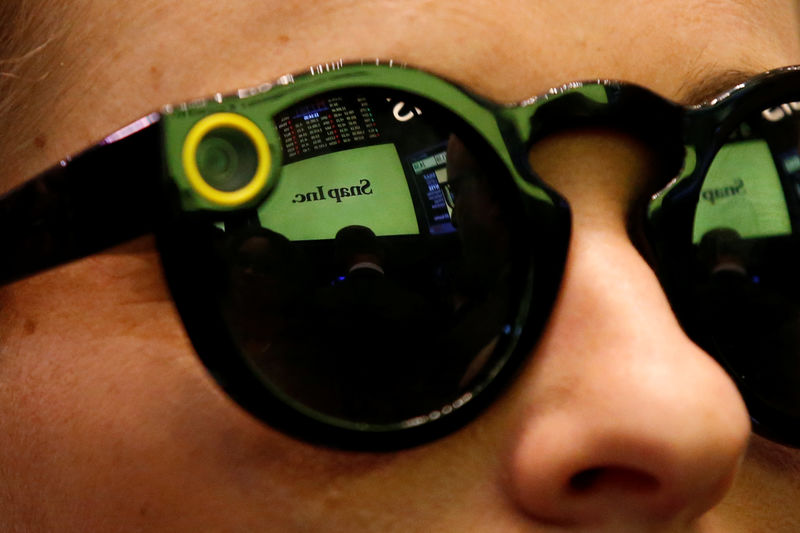By Lauren Hirsch, Heather Somerville and Liana B. Baker
NEW YORK/SAN FRANCISCO (Reuters) - Institutional investors anxious not to be left out of this year's marquee initial public offering helped Snap Inc (NYSE:SNAP) pull off the biggest U.S.-listed technology share sale this week since Chinese e-commerce juggernaut Alibaba (NYSE:BABA) Group Holding Inc smashed records in 2014.
Keen to boost returns and with a dearth of new stocks to buy, the IPO of a buzzy social media group was a "must-have" for money managers despite concerns about the company's strategy, slowing user growth and lack of voting rights for new investors, sources familiar with the offer said.
"Taking a piece of the company is almost a foregone conclusion," said Evan Pondel, president of investor relations firm PondelWilkinson Inc.
Investors' ardor for Snap shares - which rose almost 50 percent in its market debut on Thursday, giving it a market value of nearly $30 billion - bodes well for future tech IPOs.
Although blockbuster names such as Uber Technologies Inc and Airbnb Inc are not expected to go public this year, there is a lineup of smaller technology companies preparing to list in the coming months that could benefit from residual investor enthusiasm, technology investors said.
To ensure a successful market launch, Snap's bankers deployed a common tactic on big tech IPOs: they limited supply. Snap offered only 15 percent of the company to investors, including retail investors and short-term hedge funds, sources familiar with the IPO strategy told Reuters, speaking on condition of anonymity as the process is private.
"All this concern about the number of users slowing down - a tech IPO of this sort has nothing to do with the business, nothing," said Philippe Collard, founding partner at Yabusame Partners, which advises technology startups. "It has everything to do with a financial transaction where you create artificial demand.”
Hedge funds are famous for buying into an IPO only to sell shortly after, but institutional investors are not above quickly "flipping" a stock if they see an opportunity.
However, a quarter of the new offer was subject to a one-year lockup, an unusual stipulation, limiting the amount of churn.
PENT-UP DEMAND
Large actively managed mutual funds are among the most sought-after IPO investors because of their size and their tendency to hold stocks for longer. They develop strong ties to IPO underwriters by virtue of being prolific IPO investors and providing the banks' brokerage business with trading fees.
These funds are also under pressure to boost performance as investors redirect tens of billions of dollars each month into index-tracking funds, which cost less and over time have performed better.
Fidelity Investments, BlackRock, T. Rowe Price and Wellington Management began piling into pre-IPO tech companies in 2014, and both Fidelity and T. Rowe Price invested in Snap during a private funding round last year, positioning them to benefit from Thursday's pop.
Fidelity and T. Rowe Price declined to comment on whether they had bought into the IPO this week.
There was significant pent-up demand for a new internet stock. Snap, the parent group of popular disappearing-messaging app Snapchat, went public after a long dry patch in the technology IPO market, with 2016 the slowest year for such launches since 2008.
In addition to the absence of new shares, acquisitions and buy-backs have zapped investors in public technology companies of places to park their cash. Technology mergers and acquisitions and buybacks outpaced technology IPOs last year by a ratio of 38 to 1, according to Thomson Reuters data.
BEHIND CLOSED DOORS
In its IPO roadshow in New York, San Francisco, London and elsewhere, Snap Chief Executive Evan Spiegel brushed aside concerns of slowing user growth and stressed Snap's potential to change "the way people live and communicate," according to sources who attended.
Even though many funds felt compelled to invest in Snap, they still had questions for the company. But they asked the toughest ones - about the company's corporate governance and slowing user growth - behind closed doors, in small meetings between management and the underwriters' preferred clients, sources close to the situation said, asking not to be named because the process is confidential.
Such a dynamic is typical of such a high-profile IPO, when a full order book is all but guaranteed.
Those investors invited only to the roadshow lunches and keen for a decent allocation are more interested in impressing the IPO bankers – who take notes on who attends – with how closely they have read up on the company, and do not want to jeopardise their chances by rattling the company management, said investor relations experts, bankers and lawyers.
"It's like going to do the college visit. When it's time to decide who to admit, you look to see who put in the effort," said Lise Buyer, a principal with the IPO advisory firm Class V Group.
On the roadshow, Snap largely deferred questions about its user growth in public sessions. In New York, not a single question was asked about the company's first-of-its kind share structure that offers IPO investors no voting rights.

"It’s an exercise in diplomacy," Pondel said. "You can't be too chest-pounding, because that’s not someone they may want to have a piece of the company."